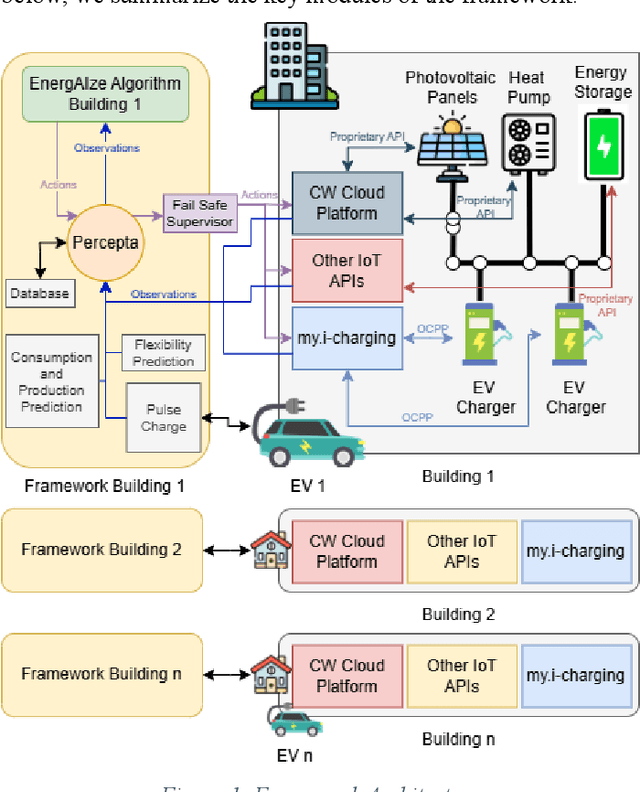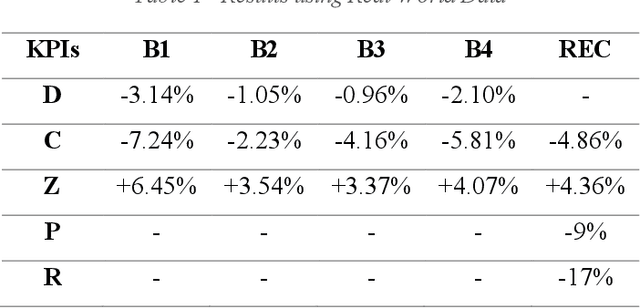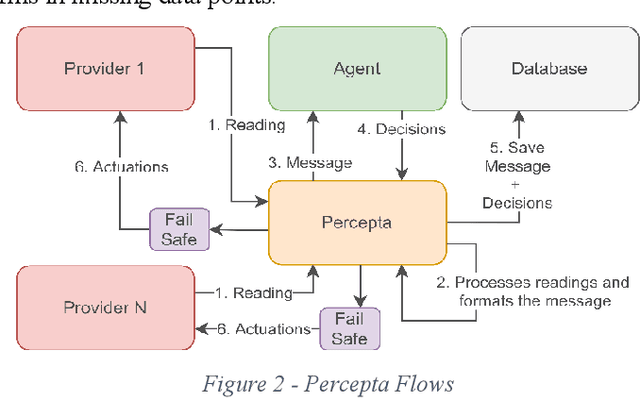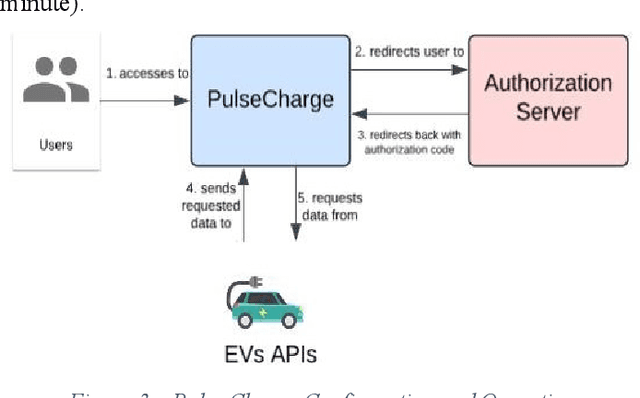Luis Lino Ferreira
Control of Renewable Energy Communities using AI and Real-World Data
May 22, 2025



Abstract:The electrification of transportation and the increased adoption of decentralized renewable energy generation have added complexity to managing Renewable Energy Communities (RECs). Integrating Electric Vehicle (EV) charging with building energy systems like heating, ventilation, air conditioning (HVAC), photovoltaic (PV) generation, and battery storage presents significant opportunities but also practical challenges. Reinforcement learning (RL), particularly MultiAgent Deep Deterministic Policy Gradient (MADDPG) algorithms, have shown promising results in simulation, outperforming heuristic control strategies. However, translating these successes into real-world deployments faces substantial challenges, including incomplete and noisy data, integration of heterogeneous subsystems, synchronization issues, unpredictable occupant behavior, and missing critical EV state-of-charge (SoC) information. This paper introduces a framework designed explicitly to handle these complexities and bridge the simulation to-reality gap. The framework incorporates EnergAIze, a MADDPG-based multi-agent control strategy, and specifically addresses challenges related to real-world data collection, system integration, and user behavior modeling. Preliminary results collected from a real-world operational REC with four residential buildings demonstrate the practical feasibility of our approach, achieving an average 9% reduction in daily peak demand and a 5% decrease in energy costs through optimized load scheduling and EV charging behaviors. These outcomes underscore the framework's effectiveness, advancing the practical deployment of intelligent energy management solutions in RECs.
CityLearn v2: Energy-flexible, resilient, occupant-centric, and carbon-aware management of grid-interactive communities
May 02, 2024Abstract:As more distributed energy resources become part of the demand-side infrastructure, it is important to quantify the energy flexibility they provide on a community scale, particularly to understand the impact of geographic, climatic, and occupant behavioral differences on their effectiveness, as well as identify the best control strategies to accelerate their real-world adoption. CityLearn provides an environment for benchmarking simple and advanced distributed energy resource control algorithms including rule-based, model-predictive, and reinforcement learning control. CityLearn v2 presented here extends CityLearn v1 by providing a simulation environment that leverages the End-Use Load Profiles for the U.S. Building Stock dataset to create virtual grid-interactive communities for resilient, multi-agent distributed energy resources and objective control with dynamic occupant feedback. This work details the v2 environment design and provides application examples that utilize reinforcement learning to manage battery energy storage system charging/discharging cycles, vehicle-to-grid control, and thermal comfort during heat pump power modulation.
An IoT Cloud and Big Data Architecture for the Maintenance of Home Appliances
Oct 25, 2022



Abstract:Billions of interconnected Internet of Things (IoT) sensors and devices collect tremendous amounts of data from real-world scenarios. Big data is generating increasing interest in a wide range of industries. Once data is analyzed through compute-intensive Machine Learning (ML) methods, it can derive critical business value for organizations. Powerfulplatforms are essential to handle and process such massive collections of information cost-effectively and conveniently. This work introduces a distributed and scalable platform architecture that can be deployed for efficient real-world big data collection and analytics. The proposed system was tested with a case study for Predictive Maintenance of Home Appliances, where current and vibration sensors with high acquisition frequency were connected to washing machines and refrigerators. The introduced platform was used to collect, store, and analyze the data. The experimental results demonstrated that the presented system could be advantageous for tackling real-world IoT scenarios in a cost-effective and local approach.
 Add to Chrome
Add to Chrome Add to Firefox
Add to Firefox Add to Edge
Add to Edge